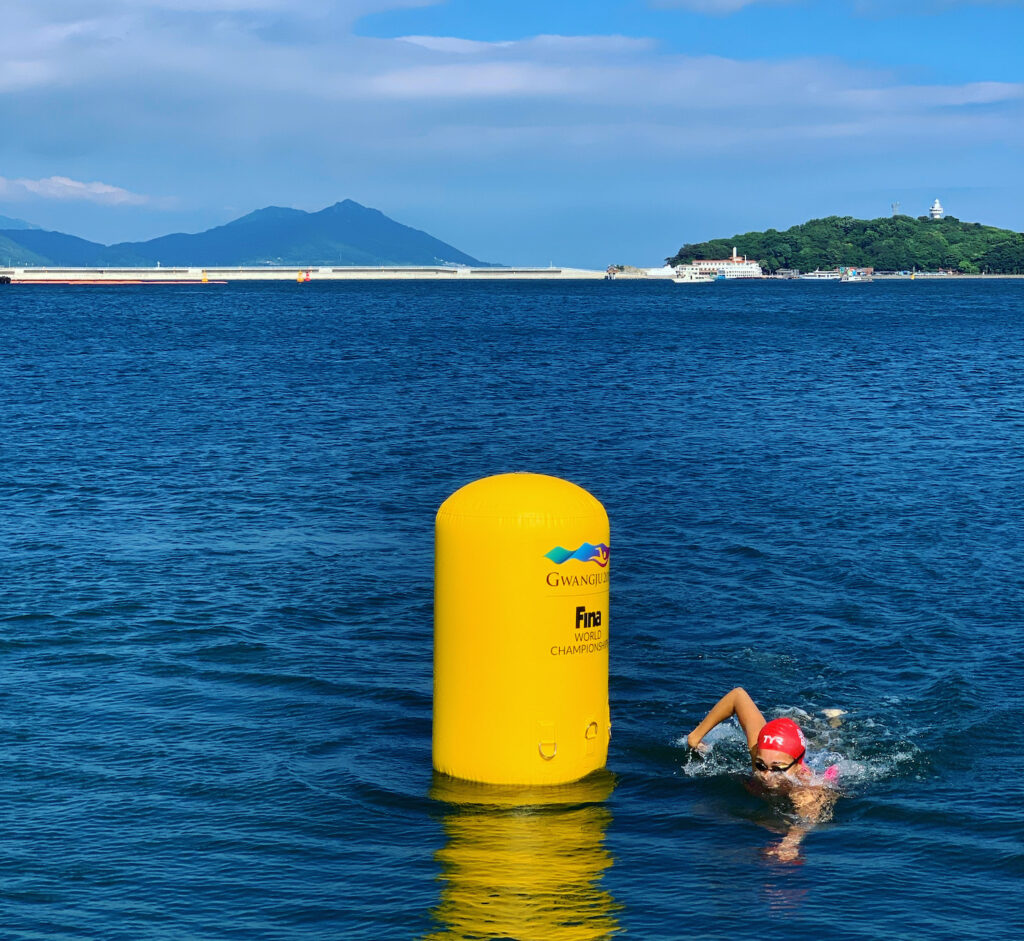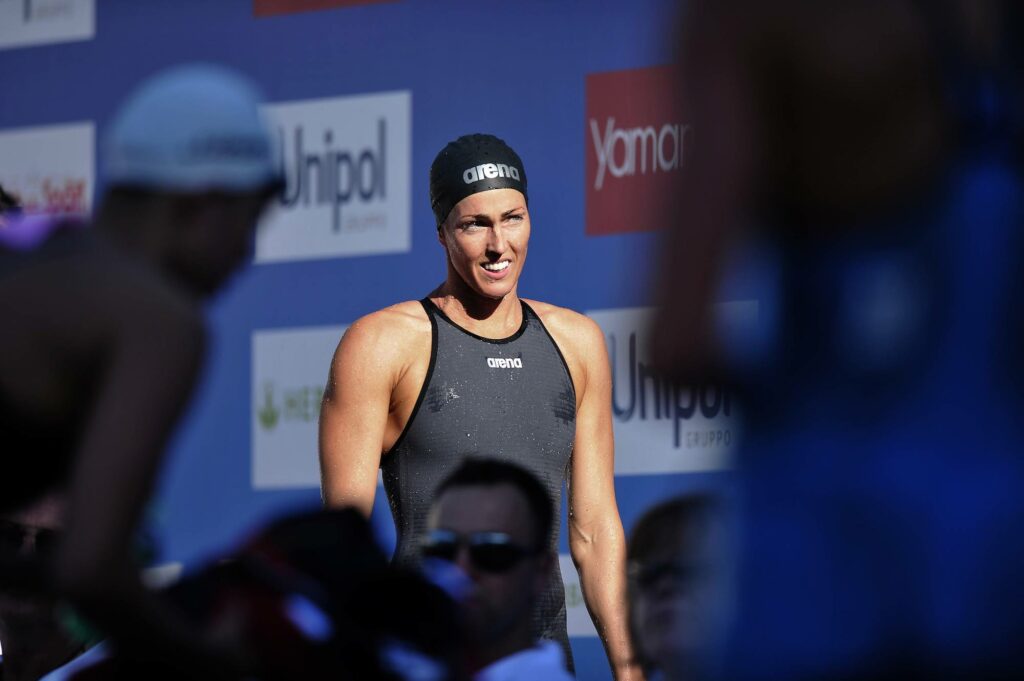In this episode of The #AskASwimPro Show, we chatted with Alice Dearing, one of Great Britain’s top marathon swimmers, having represented Team GB at numerous competitions, including three World Championships! Alice is also a Co-Founder of the Black Swimming Association and is on a mission to promote inclusivity and diversity in swimming. Alice shared how she stays motivated to swim faster, grow our sport, and transform the perception of swimming for the black community.
Alice’s Swimming Story
Alice started swimming competitively at 8 years old. From that point, she progressed quickly, qualifying for her first British national team at age 16.
Alice’s main event is the 10k open water swim, also known as the marathon swim. She’s a major distance lover!

Related: English Channel, Lake Tahoe Marathon Swimmer Catherine Breed
Currently, Alice is working on her Master’s at Loughborough University. She’s also training with the hope of making it on the British Olympic team for Tokyo 2021.
The Perks of Marathon Swimming
To Alice, the main difference between marathon swimming and shorter races, like the 50 free, is that there’s more flexibility during the race. In a sprint such as the 50 free, everything has to be perfect: your stroke, your start, your turns. It all has to fall into place.

For a 10k, there are opportunities to fix mistakes since the race is much longer. Alice feels she has more control over her performance than pool sprinters do.
In 2016, Alice won the 10k at the World Junior Championships, and she says that while she made a few mistakes, she was able to make up for them and achieve the outcome she wanted over the course of the race. There’s always room to improve the race execution!

Related: Why You Should ALWAYS Swim with a Buddy in Open Water
For those new to open water swimming, Alice suggests finding a club or a local swim buddy for guidance and safety. But don’t be nervous, just get out and do it!
Competing in Nature
Alice lists 2 competitions among her most memorable. In 2018, she traveled to the Seychelles for the FINA Marathon Swim World Series, and was blown away by the area’s natural beauty. She also recalled swimming in some of Switzerland’s incredible lakes.

Related: How to Swim Straight in Open Water
Alice noted that she feels very lucky to compete in open water, because she gets to surround herself with beautiful scenery every day!
Advocating for Diversity in Swimming
Alice is passionate about increasing diversity in swimming globally. Throughout her 15-year swimming career, Alice has experienced issues related to race and diversity in the sport. As she got older, she realized that she was ready to have more serious conversations about these issues to try to make an impact.

She is a co-founder of the Black Swimming Association, a non-profit that works to improve diversity in aquatics in the United Kingdom and will eventually expand its reach internationally.
The BSA provides water safety programming and resources to help combat the aquaphobia that is so prevalent among black adults and reinforce the recreational and safety benefits of learning to swim.
Alice feels proud to be a role model for swimmers of all ages, but understands that her role is important in influencing people to try the sport.

Related: Where Are All the Black Swimmers?
Alice is also partnered with SoulCap, which makes swim caps for swimmers with larger hair. Alice notes that black women often struggle to find caps that fit properly, and it can be a barrier to them really giving the sport a try. She is all for reducing as many barriers to the sport as possible.
Busting Swimming Myths
Alice often hears the same concerns over and over from black swimmers who are apprehensive about getting in the water. One of the most common? “Our bones are too dense. We’ll since if we get in the water!”

Alice is working to break people out of this mindset. She highlights Simone Manuel as a great example of black people in swimming — she won the 100 freestyle at the 2016 Olympics! Manuel — and Alice herself — are living proof that black people can swim.
She hopes that her work will break down these stereotypes so that in 5 or 10 years, black people will see through long-standing stereotypes and venture into the water with confidence.
Training After Lockdown
Speaking of confidence, Alice wasn’t feeling very confident when she got back in the pool after 12 weeks of lockdown. She was among a small group of elite swimmers who were allowed back in the water earlier than the rest of the UK, and was surprised at how good she felt after her first few training sessions. She was in a good place, training wise, before the pandemic, and had her sights set on an Olympic qualification.

Now, she’s training hard to make that dream a reality in 2021. Her comeback has gone well, and she has been able to gain back the majority of the fitness she had lost.
Her training has to coincide with her studies, which has helped her find a nice balance that helps her focus.
Alice incorporates dryland workouts into her training too, and names pull-ups among her favorite exercises. They’re challenging, and she loves seeing her progress.
Staying Inspired
When it comes to role models to keep her inspired, Alice has quite a few. She looks up to tennis legend Serena Williams, finding motivation in Williams’ work advocating for women in sports, and especially mothers in sports.

On the swimming side, Swedish swimmer Therese Alshammar is Alice’s main inspiration. Growing up, Alice loved watching international swim competitions, and each time Alshammar came out to race, she always had a big smile on her face. Alice has always looked up to her and tries to bring the same positivity to each of her own races.

She also gave a shout out to her teammates at Loughborough University. She has swum with the team for 5 years, and enjoys the camaraderie, energy and motivation her teammates provide.
And last, but certainly not least, Alice notes that her mom has been her rock for her whole swimming career. Like many swim parents, Alice’s mom stood by her through years of early morning practices and long competitions. Alice wouldn’t be where she is today without her!
Advice for Swimmers Struggling During Lockdown
For swimmers who are still out of the water, Alice suggests continuing to do whatever cardio and aerobic training possible, while not pushing it to the limit. During lockdown, Alice tried to get into running, and ended up injuring her ankle, which put her off track for a few weeks. She recommends that if swimming is your main sport, do your best to take it easy on new training modalities to give your body time to adapt.

A few months out of the water can feel daunting, but Alice wants swimmers to know that it’s not as bad as you may think! She encourages swimmers to give themselves 2 weeks to get their feel for the water back, and their fitness will return.
Follow Alice’s journey on Instagram at @alicedearingx. Stay up to date with the Black Swimming Association’s important work at @blackswimmingassociation.

